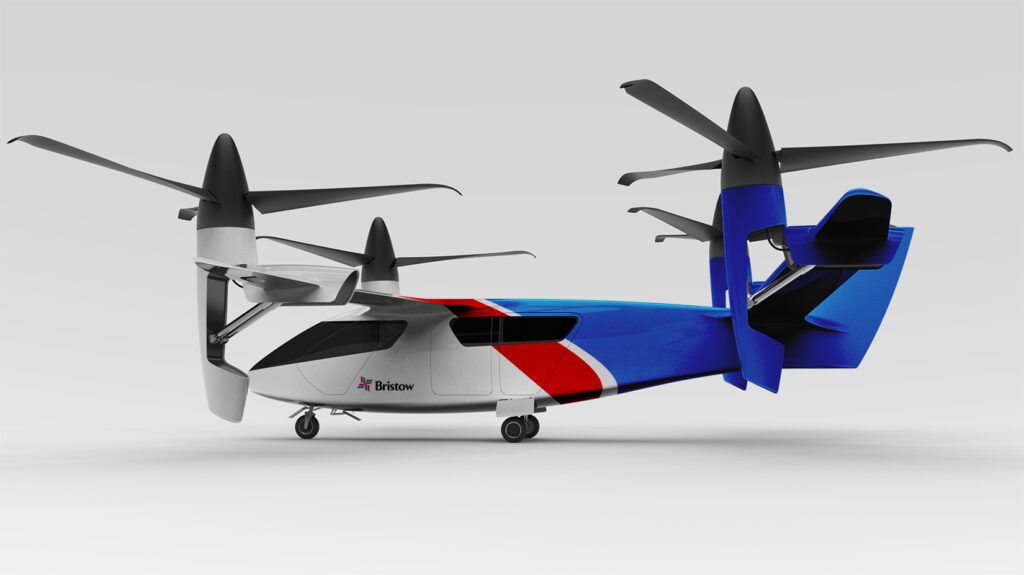
Overair and Bristow Group signed an MOU to work together on commercialization plans for Overair’s Butterfly eVTOL aircraft. Bristow has also pre-ordered between 20 and 50 Butterfly aircraft.
A new collaboration between Overair, electric vertical take-off and landing (eVTOL) vehicle developer, and global provider of sustainable vertical flight solutions, Bristow Group, aims to develop commercialization plans for Overair’s Butterfly eVTOL aircraft. Bristow has placed pre-orders for up to 50 of the Butterfly aircraft as part of the Memorandum of Understanding (MOU) that the two companies signed.
According to a Dec. 16 press release, Overair and Bristow “will work together to develop an operations development framework focusing on vehicle design considerations, key performance parameters, FAA certification, flight planning best practices, data sharing for improvement of flight operations, connected vehicle and health monitoring strategies, configuration and maintenance protocols, infrastructure, ground support operations, connected fleet management, and government affairs and promotion of eVTOL operations.”

Overair’s Butterfly: 0 carbon emissions in flight, dependable route availability regardless of weather conditions, and top speed of 200 mph.
Overair’s CEO, Ben Tigner, remarked that Bristow’s significant experience in vertical transportation will accelerate the development and commercialization of the Butterfly aircraft. “Their operating insight, combined with our development and execution of the Butterfly program, will position Butterfly to serve Bristow as a valuable workhorse on high-density routes,” said Tigner.
Chris Bradshaw, President and CEO of Bristow, looks forward to the partnership and the expanded opportunity to advance Bristow as a leader in the vertical transportation market. Some of the unique features of the Butterfly eVTOL aircraft include reduced noise levels, low maintenance costs, and ability to navigate varied weather conditions make it a useful addition to high-density routes with environmental concerns and unpredictable or harsh weather patterns.
In an interview with Avionics International, Josh Aronoff, Overair’s Head of Business Development, explained that Butterfly is ideal for metropolitan areas such as the Northeast Corridor. “If you schedule your day around a flight departing from JFK,” he wrote, “you must be able to depend on your EVTOL ride to get you there, even if the weather changes.”

Butterfly offers a range of 100+ miles, 5 passengers plus cargo, and a 2-3x redundant flight control system.
The Butterfly aircraft is built to carry five passengers in addition to a pilot and luggage. Aronoff noted that early use cases for Butterfly are likely to be airport shuttle operations and cargo/medical transportation. “Through current and future partnerships with infrastructure providers, and by working directly with municipal governments, we are also laying the groundwork for future vertiport development,” said Aronoff.
The Butterfly program was initiated in 2018 and is on track to certification in 2025, with commercial entry into service following in 2026. An advantage of their focus on the long-term market is that “the maturity of FAA regulations, infrastructure, and airspace management [are expected] to coincide with our timeline.” Additionally, Aronoff stated, “We chose not to quickly build an experimental demonstrator or any additional sub-scale vehicles [they have already flown two so far] and instead focus our efforts on ensuring each activity undertaken by the program significantly advances the design towards certification and increases the technical maturity of Butterfly in an accretive manner.”
Bristow’s priorities as it diversifies its operations are a fleet that can offer efficient vertical lift and aerial transport services. The company, which is one of the world’s largest helicopter operators, is also committed to establishing a more sustainable fleet and reducing its carbon footprint. Of the range of vehicles Bristow is considering, according to the press release, Butterfly is the only one with a vectored thrust configuration.
Aronoff commented that the vectored thrust design is aerodynamically efficient—perhaps the most efficient in an aircraft for the long-term market—and that the increased complexity and effort in design and development will ensure a competitive advantage. It also features “several layers of redundancy and low disk loading, and takes advantage of our unique technology, including cyclic control, to drastically reduce vibratory loads in transition.”
Helicopters and tiltrotors today have less aerodynamic efficiency because they are limited to certain RPM ranges which prioritize engine-driven operational speeds, said Aronoff. With Overair’s patented Optimum Speed Propulsion system, in comparison, “We can greatly vary the RPMs of our rotors between vertical flight and forward flight to keep the blades operating at peak aerodynamic efficiency during all modes of operation, which unlocks a tremendous amount of efficiency in the propulsion system.”